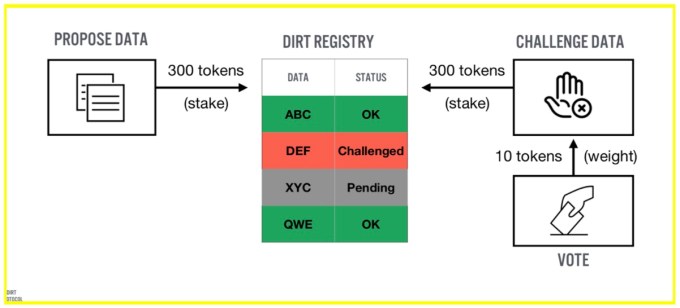The team at Dirt Protocol is using blockchain technology to create a new approach to verify information.
The startup doesn’t plan to launch its platform until later this year, but it announced today that it has raised $3 million in seed funding from General Catalyst, Greylock, Lightspeed, Pantera Capital, Digital Currency Group, SV Angel, Avichal Garg, Elad Gil, Fred Ehrsam Linda Xi and others.
Founder Yin Wu previously created lockscreen startup Echo (acquired by Microsoft in 2015) and laundry startup Prim. She told me that after becoming interested in the cryptocurrency industry, she was concerned about the fear, uncertainty and doubt around coin offerings — after all, we’ve covered several ICOs where companies appear to have disappeared with people’s money.
“The market today is still unregulated, with high incentive for people to spread misinformation for personal gain,” Wu said.
Her solution? Build databases where anyone can contribute information, but where they have “skin in the game,” so there’s a financial penalty if they’re not truthful.
Dirt Protocol isn’t trying to create a single, definitive data repository, but rather to provide the tools for developers to build their own databases. Those databases might focus on things like ICOs (providing information like the team, the investors and the number of tokens in circulation), or online publishers (to help advertisers avoid bots), or professional listings and membership lists.

There will be a single token that works across the Dirt platform. Users will need to stake tokens to add new information to databases, to challenge an entry or to vote in disputes — you’ll be penalized (by losing tokens) for adding misinformation and rewarded for weeding out misinformation.
While that should create an economic incentive for people to not just avoid inaccuracies but also to actively remove them, it doesn’t fully address the question of determining the truth — who, ultimately, gets to decide whether an entry is accurate? Wu said Dirt will support a variety of different “governance structures,” whether that’s centralized moderation, free-for-all voting or a system where votes are weighted by reputation.
Wu also suggested that the system is designed in a way to discourage concerted misinformation campaigns. For one thing, hoaxers will probably want to target the more popular databases, but those are also the ones that should attract more active moderation. Plus, she said, “The more valuable the network, the more people are contributing information, the more expensive [it becomes to contribute].”
A recurring theme in our conversation is the advantage of a “decentralized” approach to data verification. Wu said that isn’t always the right way to go, but she said it makes sense when there’s a big platform with the centralized vetting that works too slowly, or in situations where “you can’t trust the curator” of information, or with data sets that are just proprietary and expensive to access — while you have to buy tokens to contribute information, Wu said that Dirt Protocol datasets should be freely accessible, and “no single party owns that information and can shut off access.”
In a similar vein, she said Dirt Protcool isn’t currently focused on making money. Ultimately, the business model will probably involve some combination of giving the software away for free and charging for additional services.
“We’re focused on creating this open dataset that anyone can use,” Wu said. “If we achieve that goal, I’m confident that some monetization will arise.”
Source: TechCrunch http://j.mp/2N33oqE
No comments:
Post a Comment